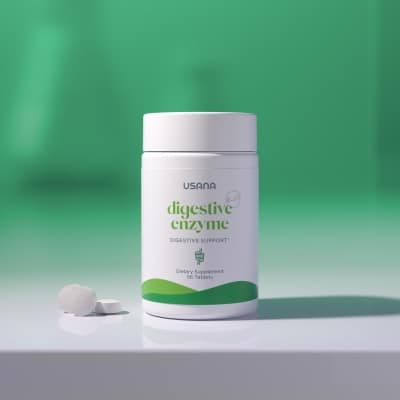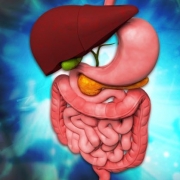瞭解如何使用USANA®消化酵素讓您的肚子平靜
USANA®消化酵素
含有綜合植物酵素和朝鮮薊萃取物,幫助您充分利用您的膳食並緩解消化不適。
有人說:「快樂源自一頓輕鬆愉快的早餐。」(美國記者約翰岡瑟)雖然一頓美食絕對是人生最大的樂事之一,但如果您在用餐結束後讓您感到不舒服,這種快樂當然會變成哀愁。請使用USANA消化酵素幫助您保持肚子舒坦,並為您的身體提供營養。*
隨餐服用這款膳食補充品,攝取各種植物酵素和朝鮮薊萃取物,為您的日常保健提供兩個主要好處:
- 幫助您更有效地消化食物,以幫助吸收大量營養素(脂肪、蛋白質、碳水化合物)*
- 減輕大餐後的飽腹感、腹脹或其它偶發的消化問題*
您整體的健康和能量都依賴於滋養您所有的細胞。USANA消化酵素有助於天然地幫助正常而健康的消化,因此您可以從膳食中獲得最多的營養,並且,它還能幫助您減輕進食後偶爾出現的腹部不適。因此,比較不會出現溫和但可能令人尷尬和不舒服的排氣或腹脹,並且可以真正品味人生。*
消化酵素在健康中的作用
從您看到、聞到或品嚐了食物的那一刻起,您的嘴巴開始分泌唾液,您身體複雜的消化過程就啟動了。咀嚼和吞嚥後,食物會通過您的胃、腸和後續消化系統,分解成您身體需要的許多物質,以維護您的健康,並為您的日常活動提供能量。
您的消化酵素是消化過程的一部分,它們是幫助分解食物並將食物轉化為細胞所渴望的化合物的物質。您的身體在消化過程中會自行產生酵素(包括您的唾腺、胰腺和肝臟)有助於將大分子的脂肪、蛋白質和碳水化合物分解。
當您擁有正常、健康的酵素分泌功能時,身體就會有效地消化食物,因此巨量營養素就可被身體吸收和使用。這是有道理的,因為如果食物完全分解,您就更能夠從所吃的東西獲得最多的營養。
隨著年齡增長,體內天然消化酵素的產量會降低,這將導致您在食用某些食物或大餐後偶爾會出現輕微腹脹、排氣或不舒服的情況。
多樣化的健康飲食可以提供一些酵素,來補充身體自然產生酵素的不足。如香蕉、芒果、木瓜和鳳梨等水果,以及像優酪乳或酸白菜這樣的發酵食品都能供應酵素。植物性的補充品也可以幫助補足所有酵素的不足,提供額外的消化支援。*
植物性消化酵素主要是幫助「預消化」食物來減輕胰腺和肝臟酵素的負荷,從而幫助維持健康的消化系統。它們與胃酸搭配,在食物來到您的腸道之前就開始分解您的食物,而送到腸道時則由您的天然胰酵素接手。一些植物性的酵素可以在通過胃之後仍然保持活性,並且在整個過程中支援消化功能。*
USANA消化酵素為腹部帶來的好處
讓USANA消化酵素成為您每餐的一部分,來補充身體的天然酵素,促進最佳的消化效率。其綜合天然酵素提供多種植物性酵素,支援正常而健康的消化和不同種類巨量營養素的吸收*:
- 澱粉酵素:分解澱粉
- 鳳梨酵素:分解蛋白質
- 纖維酵素:分解纖維素(通常來自植物食材,如水果和蔬菜)
- 乳糖酵素:分解乳糖(乳蛋白)
- 脂肪酵素:分解脂肪
- 木瓜酵素:分解蛋白質
- 蛋白酵素:分解蛋白質
USANA消化酵素還使用朝鮮薊萃取物(Cynara scolymus L.)來為健康消化提供額外的支援。來自朝鮮薊葉的活性植物營養素已被證明可幫助消化脂肪類食物(特別是在大餐後),有助於緩解消化問題,如輕度胃部不適。*
腸道檢查:您需要USANA消化酵素嗎?
您的酵素平衡對您來說是獨一無二的。而且您非常可能已經知道您的消化系統是否每天需要幫助消化的產品。當您的腸胃不開心時,其表現就不佳。如果您在吃了乳糖、蛋白質、脂肪(任何種類的巨量營養素)後發現自己不舒服,那麼USANA消化酵素中含有一種能幫助您的酵素。*
即使您很少肚子出狀況,您還是應該準備一些消化酵素。因為總是有某些情況,您可能會發現自己需要一些酵素來幫忙*:
- 改變飲食習慣。長期的飲食習慣會影響您不同胰酵素的天然比例。因此,如果您突然改變飲食,補充品可能會有所幫助。例如,如果您突然大量增加吃植物性食物和纖維的數量,那麼消化酵素就能幫助緩解因為這種改變所引起的任何短暫不適。因為USANA五天健康重整™將提供比您的系統過去所習慣的更多的纖維,所以 USANA消化酵素就是五天健康重整™的實用補充品。**
- 您將要吃得超飽。說實話,有時您就是想要大吃大喝。但是好東西吃太多,也會讓您的天然胰酵素無法有效率地工作。因此,補充品可以助您的天然酵素一臂之力,減少大餐後不舒服的副作用。這可能會讓您感覺較舒服(也保持您的肚子更平坦),因為您的大餐被消化掉了。*
請記住:酵素只是消化過程的一部分。USANA消化酵素有助於有效消化,讓腸胃舒坦。您腸道裡的細菌也能支持健康的消化作用;因此,如果希望有更全面的消化支持,請考慮添加USANA益生菌。*
使用法
隨餐服用一至三片,或根據需要服用。
適用對象
- 18歲以上需要消化支援的成年人
關於消化酵素的常見問題
消化酵素的天然味道是什麼?
USANA消化酵素的天然香料是香草,它還用於其它幾種產品中,以掩蓋原料令人不快的味道。香草香料中沒有其它隱藏成份,也不含味精或任何有問題的成份。
參考資料
Janiak C. 2016. Digestive enzymes of human and nonhuman primates. Evol Anthropol 25(5): 253-266.
Raman R. 2018. 12 Foods That Contain Natural Digestive Enzymes. Healthline [Internet] [accessed 22 October 2018] Available at https://www.healthline.com/nutrition/natural-digestive-enzymes
Amylase: Enzyme Technical Data Sheet. Enzyme Education Institute. [Internet] [accessed 23 October 2018] Available at https://enzymeeducationinstitute.com/enzymes/amylase/
Lipase from Rhizopus oryzae: Enzyme Technical Data Sheet. Enzyme Education Institute. [Internet] [accessed 23 October 2018] Available at https://enzymeeducationinstitute.com/enzymes/lipase-from-rhizopus-oryzae/
Cummings JH. 1984. Cellulose and the human gut. Gut (25(8): 805-810.
您可能也有興趣
**使用效果因人而異。「五天健康重整」計劃降低您每日攝取的熱量,並建議適度的運動,以獲致最佳效果。
任何懷孕、哺乳、過敏、服用藥物、或接受醫師治療的人士,在改變飲食習慣或開始新的運動計劃時,建議您拿這些產品向您的醫生諮詢並聽取他們的建議。
18歲以下未成年人須在其醫生和/或營養師的建議下,方得參加「五天健康重整」計劃。
*這些內容未經美國食品暨藥物管理局的審閱。本產品不用於診斷、治療、醫治、或預防任何疾病。









